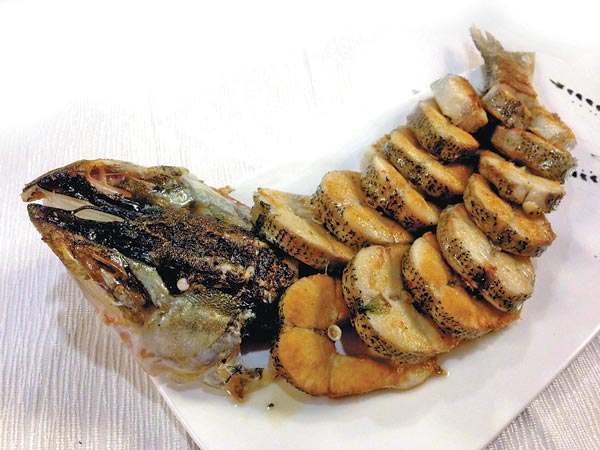 |
|
Fresh water fish. Photos by Pauline D. Loh / China Daily
|
Another unusual offering at Ruxian Guli is fish caught in the highland lakes fed by snowmelt and glacial run-offs. The fish we had did not have a Chinese name, let alone an English one, but it was definitely delicious. In the local dialect, it is called qiao'er tai.
David Zhang, the restaurant director, says the fish grows extremely slowly and it takes about three years for it to reach table size. To let diners enjoy its natural sweetness, the fish is simply grilled with no seasoning other than salt.
To eat fish at a Xinjiang restaurant is a rare luxury, and you do have to pay for the privilege, since it costs about 68 yuan per 500 grams.
While Ruxian Guli tries to show off the lesser-known specialties, it still delivers on traditional offerings, such as the whole roast lamb shoulder, freshly baked Xinjiang breads, cumin-scented savory buns filled with lamb and onions and the classic lamb kebabs.
Large chunks of lamb pierced on metal skewers are lightly seasoned here, as the chef believes in showing off the quality of the meat rather than masking it with a thick coating of cumin and chilli flakes.
It is a thoughtful strategy, and the kebabs quickly disappeared from our table.
So often, when we think Xinjiang cuisine, it is nothing more than heavily lamb on sticks, huge chunks of meat and rounds of naan slightly charred at the edges - flavors from the streets you may remember from a past visit. Ruxian Guli may just change your mind. There is a delicacy to the food here that will make it a good introduction to the exotic Northwest, especially if your guests have just landed in China.
The house salad, a mixture of greens and the sweet cherry tomatoes that are now popularly grown there, is simply doused in a vinegar and honey dressing and was a refreshing accompaniment to the meats.
We recommend:
